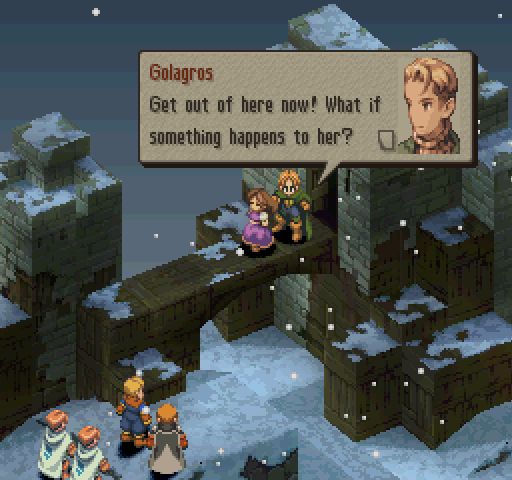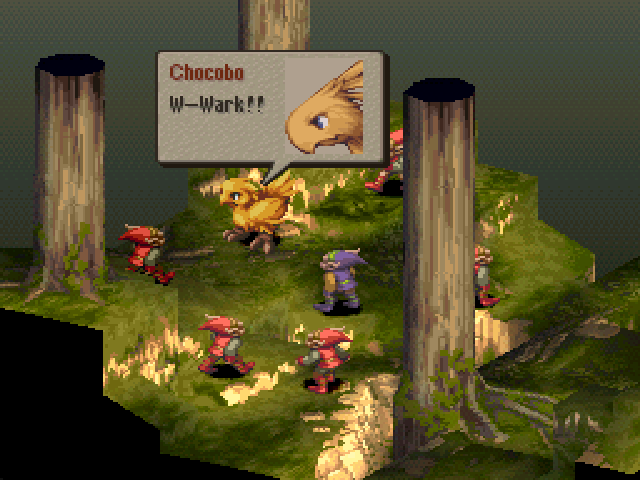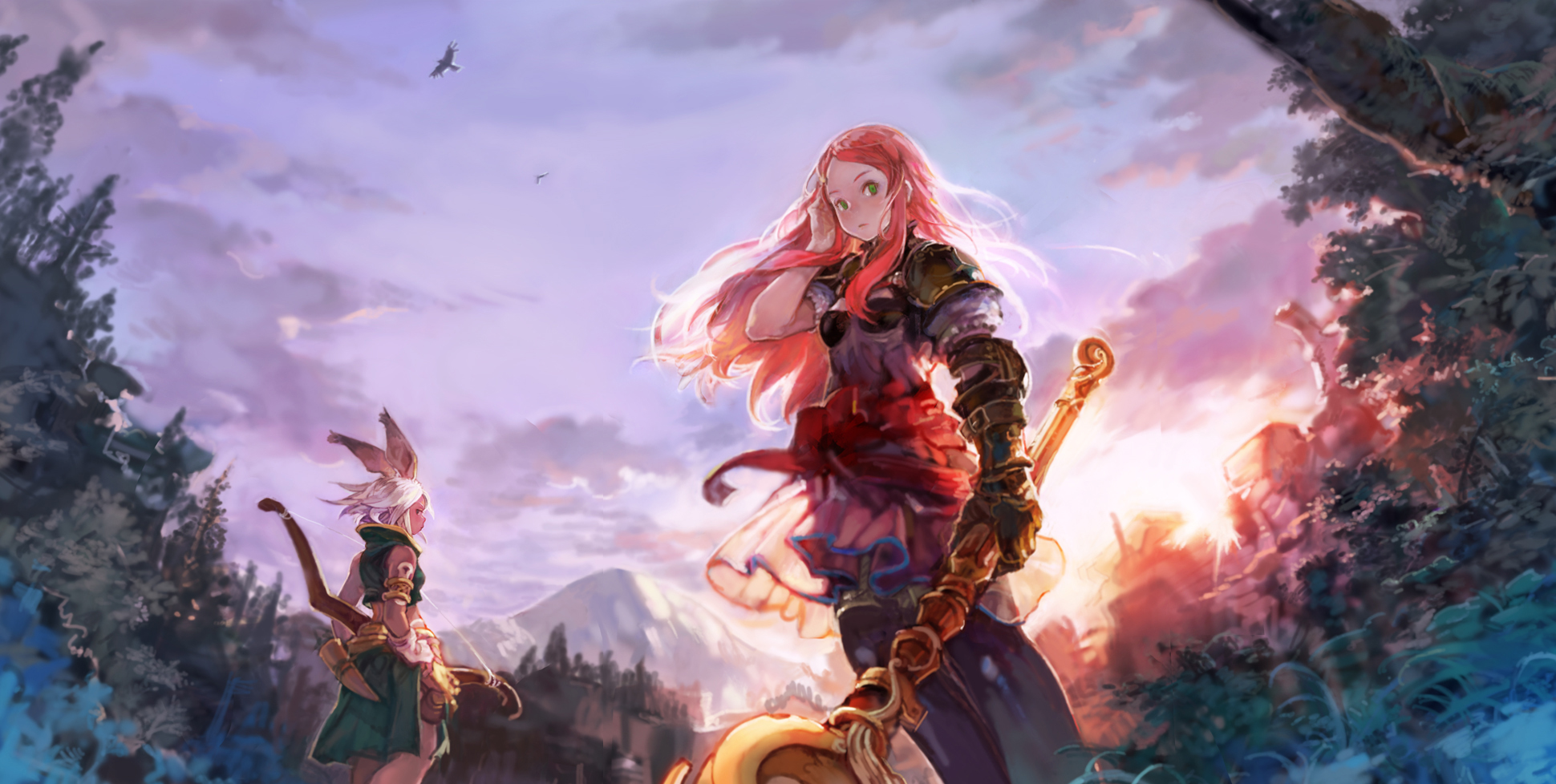
This semester, I decided to curl up with an old classic– you know, the kind you save for any variation of inclement Vermont weather. His name is Final Fantasy Tactics. It’s another one of those games that inhabits an indistinct space in my heart– part nostalgia (even though I only ever got the chance to watch my brothers play it, womp womp) and part sentimental admiration. I was big into Final Fantasy Tactics Advance, which is kind of like its twice-removed sequel sister, so I’ve always been curious as to the origins of its progenitor. It also helps that the wiki page that I have elected to edit and become the proverbial master of (also the one I’ve been neglecting, triple womp) is on the Tactical RPG genre, so it seemed fitting to research an 18 year old staple.
Final Fantasy Tactics is actually gorgeous, first and foremost. The art style and color palette is earthy and muted, and lends to the tone of the game. I should start off by saying that picking up this game was kind of like riffling through old photos, or smelling some forgotten thing from my childhood. I remembered details about the game that I couldn’t even consciously put a finger on. Delita’s sister Teta is kidnapped by the rebels, and she’s killed by the very task force of knights that was sent to retrieve her, in order to distract the kidnapper long enough to shoot a bolt through his stomach. He recedes into the cabin (filled with gunpowder) and the building explodes. And yet I remembered the snow, and the explosion, and someone dying– and I couldn’t have been older than six years old. The brain, dude. Despite its age, I still find myself consistently astounded by the quality of the visuals, considering that the game is a mere 4 years younger than me– the spell effects on the abilities are hand painted and stunning, and the stylized direction of the characters still looks great. Interestingly, the only element of Final Fantasy Tactics that really feels ‘aged’ is its method of storytelling. By that I mean, Final Fantasy Tactics seems otherwise unaware of the sheer amount of arbitrary names and places injected into the dialogue for mere shits and gigs, seemingly– like an errant chapter of Game of Thrones gone bad. I realize that this is kind of a known problem with the fantasy genre in general, but the localization crew responsible for the English translation of the game sort of, had… iffy results IMO?
One example: The aforementioned Delita and protagonist Ramza are a part an organization called the Hokuten, an order of knights that are loyal to his brothers, Zalbaag Beoulve and distantly, Dycedarg Beoulve. It’s like… faux japanese sci-fi fantasy. Not to mention that the game likes to introduce concepts and kings and war factions every fifteen seconds, so the entire wasp’s nest of plot devices just continues to grow muddier and more wasp-filled by the minute– which sure, is frustrating, but I guess it’s only a minor setback to the game’s accomplishments. The overall plot is all still alive and well, so it’s no real impediment to the sentiment of the game. But still. It’s also come to my attention that the PSP remake of the game, Final Fantasy Tactics: War of the Lions, fixes a lot of the dumb names and attempts to balance the tone of the the nomenclature (The Hokuten are now called the Order of the Northern Sky, for instance) to that I say, you can’t just pretend like you didn’t make mistakes, Square Enix.

Let’s move onto more things I love about this game, however. Or rather, let’s talk more intensely about the design. As a healthy competitor within the Tactical RPG genre, up there with the likes of Tactics Ogre: Let Us Cling Together, and Fire Emblem– you have this kind of steep learning curve coupled with a kind of steep playing time. As in, it’s always a little too easy to lose track of the hours with this guy. You have 5-7 units at your disposal, normally, each with their own sets of weapons and armor, skills and abilities, classes and subclasses– you gotta keep track of where they are, when their turn is coming up, oh, and how long each spell will take and when it will be executed in the sequence of turns. A lot of shit going on, and a whole hell of a lot of menus to do it (don’t get me stared). TL;DR, this isn’t a pick-up-and-play kind of game, and I don’t think it’s the biggest offender in the genre, either.
So then what’s the draw? Why do people love this shit? I seem to recall stumbling across a statement by the creator of American Mcgee’s Alice, (you guessed it) the eponymous American Mcgee, and while I can’t seem to find the text directly, I’ll certainly attempt to paraphrase it: he was saying that too many dev groups try to bog their game’s down with needless mechanics, and that seeking to make a difficult game for the sake of difficulty is actually why a lot of games suck. He was trying to make a case for why game’s should be uncluttered and easy to play, because that’s what’s fun. Under that logic, shouldn’t Final Fantasy Tactics be obscenely un-fun then? I’m definitely and very obviously disagreeing with American here, but in an argumentative way, he does have a point. For some games, that’s what works for them– and others, not so much. I think what makes Tactics special and engaging is the long-term reward of playing it and developing characters and playing effectively. The game is fundamentally strategic because you might choose to move a wizard out into the fray in order to better target a grouping of monsters, but you might end up losing the unit (which might make you end up losing the match). Is game difficulty inherently satisfying, or is it a speed bump? Questions for a later evening, I suppose.
